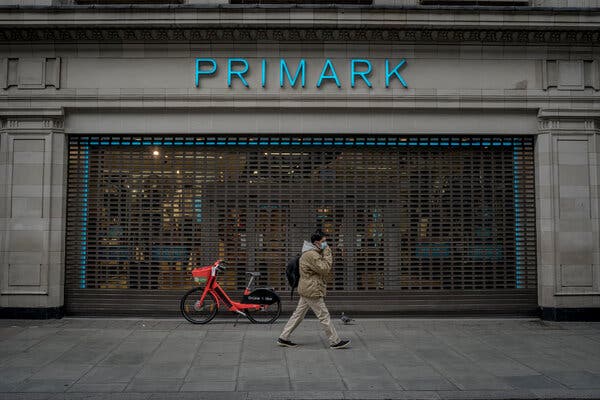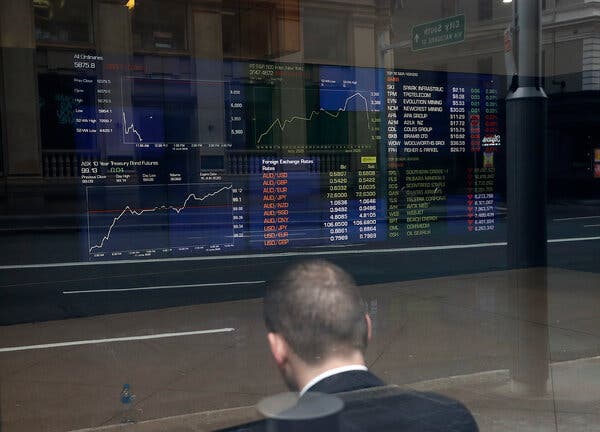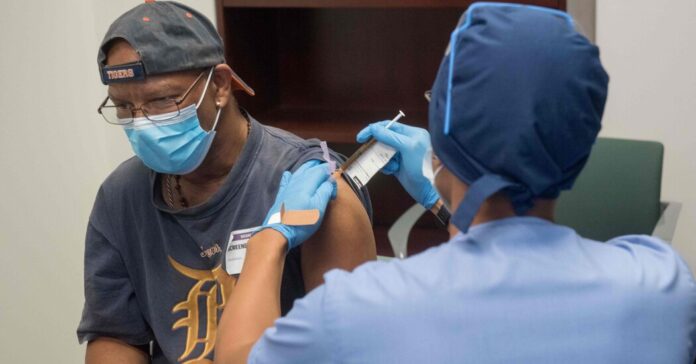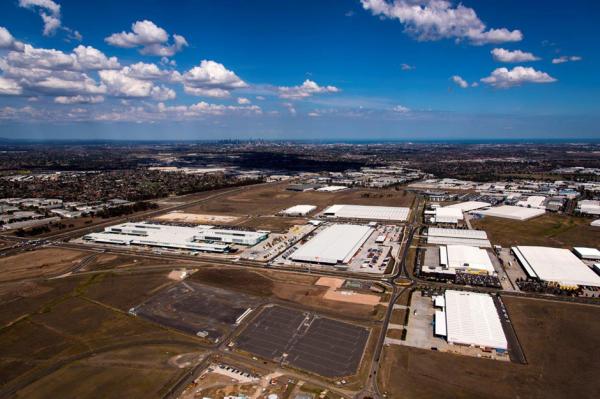-
Global markets started the week strongly on Monday as investors saw positive signs in a new Asian free-trade deal and a report that Moderna’s coronavirus vaccine was 94.5 percent in preliminary tests was expected to push the markets higher. Wall Street was poised for a 1.2 percent gain when trading starts later in the day.
-
The news from Moderna, a drugmaker based in Cambridge, Mass., pushed the company’s shares more than 10 percent higher in premarket trading. It comes amid growing optimism among investors about the chances for a vaccine to control the coronavirus.
-
Last week, Pfizer, in collaboration with BioNTech, was the first company to report preliminary data on an apparently successful vaccine, saying that its vaccine was more than 90 percent effective. Pfizer shares were lower in premarket trading on Monday.
-
European markets jumped after the news. The benchmark Stoxx Europe 600 doubled its gain for the day, up to 1.6 percent higher. Other European indexes rose by a similar amount. Earlier in the day, Asian shares closed higher, with the Shanghai Composite in China gaining 1.1 percent, while the Kospi index in South Korea ended 2 percent higher.
-
Oil futures also climbed higher, on expectations that a successful vaccine will bolster the demand for oil. West Texas Intermediate, the U.S. benchmark, gained 3.7 percent. The yield on 10-year U.S. Treasury notes soared, as traders decided to take on riskier investments.
-
One of the world largest regional free-trade agreements — covering 15 Asian-Pacific nations, led by China — was formally approved on Sunday, signaling an effort by Beijing to curb American influence in the region. It follows a retreat by the United States from sweeping trade deals that reshape global relationships.
-
Japan reported robust economic growth, led by rising domestic consumption and a rebound in exports. But analysts said the gains — 5 percent growth during the July-to-September period, for an annualized rate of 21.4 percent — were unlikely to to be long-lived, because a new wave of coronavirus cases has prompted lockdowns in Europe and the United States, threatening the upswing in sentiment in Japan.
-
PNC, a regional bank based in Pittsburgh, announced it had acquired the U.S. assets of the Spanish lender BBVA, an $11.6 billion deal that would create fifth-largest American retail bank. For PNC, it is latest in a string of acquisitions to expand its national footprint.
-
Shares in Vodafone, the Britain-based mobile operator, rose more than 3 percent after it reported “increased confidence” in its outlook. The pandemic has reduced roaming fees and phone sales, but the company projected adjusted core earnings of 14.4 billion euros ($17 billion) to 14.6 billion euros for its 2021 financial year, compared with 14.5 billion euros for the previous year.

As if a pandemic accompanied by a global economic downturn were not trouble enough, manufacturers in Britain are now confronting the intensifying possibility that their country may soon crash out of the European Union without a deal governing future commercial relations across the English Channel.
The prospect of a no-deal Brexit has long threatened to trigger job-killing, investment-discouraging mayhem in Britain and in major European economies, impeding the flow of goods through ports and rendering uncertain the rules applying to major industries — from finance to agriculture to manufacturing.
Now, that prospect is growing increasingly real. A transition period during which nothing has changed is set to expire at the end of the year. Barring a trade deal between Britain and the European Union, the transition will end abruptly, with the terms of trade unclear. Given that Britain sends nearly half its exports to the European bloc, a rupture in dealings could bring profound economic damage.
Prime Minister Boris Johnson of Britain has long sold Brexit as the beginning of a glorious new era that will bolster his country’s fortunes through expanded trade with the world. But his primary aspiration — a trade deal with the United States — was always more about political optics than economic gains. An agreement looks less likely with the electoral defeat of President Trump, a Johnson ally and Brexit champion. The incoming American president, Joseph R. Biden Jr., has favored multilateral trade blocs, like the one that Britain is abandoning.
British factories are bracing for fresh pain. Already battered by the pandemic, which has played out with especially lethal force in the Britain, and suffering lost sales in the face of the global recession, manufacturers in England are strongly inclined to view Brexit as another wound to manage, and not the spur to commerce portrayed by the government.
Only 3 percent of small and medium-size factories express confidence that Brexit will have a positive impact on their efforts to recover from the pandemic, according to a survey released Monday morning by a pair of trade associations, the South West Manufacturing Advisory Service and the Manufacturing Growth Program.
Small and medium-size manufacturers “have been battered by Covid-19, and now they have the additional challenge of recovering with Brexit looming large on the horizon,” Nick Golding, managing director of the manufacturing advisory service, said in a statement accompanying the release of the Manufacturing Barometer. “It’s like a perfect storm for management teams trying to plan.”
The report draws on surveys with more than 400 companies in England, polling them on their experiences between July and September. It found that 47 percent were confused about how the departure from the European Union would affect their businesses — a worrying finding given that 62 percent overall said their businesses remained below volumes before the pandemic.
One-fourth of respondents anticipated that recovery would take between one and five years, a process not helped by a breach with the nation’s largest trading partner.
President-elect Joseph R. Biden Jr. last week placed proponents of stronger regulation on financial regulatory teams, stoking fears by industry groups that he is preparing for an unexpected wave of corporate oversight.
It would be a sharp reversal from the Trump administration, which for four years benefited Wall Street with its push to loosen bank rules and weaken post-crisis financial regulations, Alan Rappeport and Jeanna Smialek reported.
Among those selected for the financial regulatory transition teams are Gary Gensler, who led the Commodity Futures Trading Commission during the Obama administration. He pushed through dozens of tough rules after the 2010 Dodd-Frank law, including some that the Trump administration has watered down.
Also on the teams are Leandra English, a former deputy director of the Consumer Financial Protection Bureau, and Dennis Kelleher, a co-founder of Better Markets, a prominent financial reform advocacy group. Ms. English tried, unsuccessfully, to prevent Mr. Trump from installing a critic of her bureau, Mick Mulvaney, as its acting director three years ago.
While a Biden presidency may be constrained by a divided Congress, regulatory agencies wield enormous power given their ability to write and interpret rules and decide how strictly to enforce them.
For example, a Biden administration could reinstate the consumer bureau’s efforts to limit payday lending and install leaders at the Securities and Exchange Commission and Labor Department who support “sustainable investing.”
Some view the “landing teams” as a sign that Mr. Biden is heeding the concerns of the progressive wing of his party and planning to put consumers ahead of corporations.
Banks, though wary, are not without a say in Washington.
“They get their voices heard enough — we know what they think,” Anat R. Admati, a professor of finance and economics at Stanford University’s Graduate School of Business and an expert in regulation, said of the banks. “There are a lot of people hurting in this economy. The financial sector is not among them.”

The Australian Stock Exchange closed early on Monday following a glitch after upgrades went live, in the bourse’s worst outage since 2016.
Shortly after trading commenced at 10 a.m. local time, the exchange said it became aware of a market data issue. At 10:24 a.m., trading was paused. Before the stoppage, the S&P/ASX 200 index had been up 1.2 percent, its highest level since Feb. 27.
In the afternoon, the market said it would close for the rest of the day. In a statement, it said the issue had been identified and would be resolved overnight in time for normal trading on Tuesday.
“ASX is very disappointed with today’s outage and sorry for the disruption caused to investors, customers and other market users,” Dominic Stevens, the exchange’s managing director and chief executive, said in the statement.
ASX said a software issue related to the trading of multiple securities in a single order created inaccurate market data. Monday was the first day its Trade Refresh project, an update to its equity market trading platform, went live.
“Notwithstanding the extensive testing and rehearsals, and the involvement of our technology provider, ASX accepts responsibility. The obligation to get this right and provide a reliable and resilient trading system for the market rests with us,” Mr. Stevens said of the upgrade.
The outage is the longest since September 2016, when the exchange was shut for several hours at the open and close of trading because of a hardware failure.

Jay Clayton, the former corporate lawyer who led the Securities and Exchange Commission during the Trump administration, will step down by the end of the year, he announced on Monday. The move was first reported in the DealBook newsletter.
In nearly four years as chairman, Mr. Clayton largely lived up to the pledge he delivered in his first speech on the job, forgoing “wholesale changes to the commission’s fundamental regulatory approach.” He presided over a regime largely free of drama or major changes at the agency — aside from a prominent battle with Tesla’s chief executive, Elon Musk.
When he was chosen to head the S.E.C. in 2017, few expected Mr. Clayton to make waves. He had spent decades as a lawyer at the white-shoe law firm Sullivan & Cromwell, working with clients like Alibaba, Barclays and Goldman Sachs. His nomination by President Trump to fill a term that expires in June 2021 was somewhat of a surprise, given that Mr. Clayton had been known for being largely apolitical.
His focus at the agency was protecting “the long-term interests of the Main Street investor,” he said. That approach surfaced in moves like stopping the car-rental company Hertz from selling stock while in bankruptcy protection and cracking down on cryptocurrency frauds.
He also expressed skepticism about the transparency of disclosures for special purpose acquisition companies, the blank-check investment funds known as SPACs that have become hot on Wall Street, echoing concerns that they may hurt ordinary investors at the expense of the savvy deal makers running them.
Critics contended that Mr. Clayton was too soft on business. But during his tenure, the commission pursued 3,152 enforcement cases, slightly more than the number brought by his predecessor, Mary Jo White, from 2013 to 2017, and also obtained orders for larger financial remedies than under the previous chief. That said, NPR reported that the S.E.C. brought just 32 insider-trading enforcement actions last year, the fewest since 1996.
The S.E.C.’s most prominent battle came when it sued Tesla in 2018 over Mr. Musk’s tweets about taking the carmaker private. It resulted in Mr. Musk stepping down as chairman and paying a $20 million fine. That same year, the commission accused Elizabeth Holmes, the founder of Theranos, of lying about her company’s blood-testing capabilities. It extracted a $500,000 settlement and barred her from serving as an executive or director of a public company for a decade, though the agency did not require her to admit guilt.
Mr. Clayton followed in the steps of many Republican leaders of the S.E.C. in pursuing deregulation. Under his watch, the commission loosened rules governing the independence of corporate auditors, adopted a conduct standard for brokers that consumer advocates argue weakened protections and proposed making most hedge funds exempt from publicly disclosing their stock holdings, generating widespread opposition.
One of the most memorable moments of Mr. Clayton’s tenure had to do with a different government post. Earlier this year, he told Attorney General Bill Barr that he was interested in becoming the U.S. attorney for the Southern District of New York, despite having never been a litigator. After Geoffrey Berman was fired from the post, a political firestorm effectively forced Mr. Clayton to back off.
It is unclear what Mr. Clayton plans to do next, though he is unlikely to take up another corporate role in the near term. Like other financial agencies, the commission is expected to get tougher on big business under President-elect Joseph R. Biden Jr.










